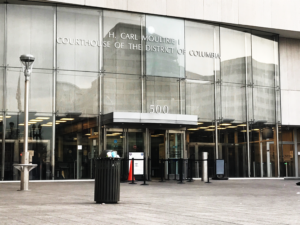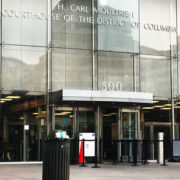By Thamar Bailey
 Going to court is not what TNT movies make it out to be. There’s not a mass crowd in the room, there’s no gavel calling for attention or crowd outbursts. As an intern for a homicide tracking blog, I’ve had the honor of going to court almost everyday and let me tell you there is definitely a break between reality and fiction.
Going to court is not what TNT movies make it out to be. There’s not a mass crowd in the room, there’s no gavel calling for attention or crowd outbursts. As an intern for a homicide tracking blog, I’ve had the honor of going to court almost everyday and let me tell you there is definitely a break between reality and fiction.
For starters the judge is almost always late.
On a good day I leave my apartment in the morning around 8:45 and end up settling into a seat at the courthouse around 9:20 for a 9:30 case – only for the judge to stroll in anywhere from 20 to 45 minutes late.
And in that time delay I sit patiently watching lawyers walk in and out and court marshals talk about their night and catch up on how each other’s morning is going.
Also, in that time there has not been a case that goes by that I haven’t learned something I really didn’t need to know about a court clerk.
I don’t know if you’ve ever noticed, but there’s a seat to the left of the judges chair where the court clerk sits. The clerk essentially orchestrates the entire production. He/she tells the marshals when to get the inmate from holding, coordinates with the judge and takes in whether or not a lawyer or witness is missing.
One day a clerk got into an argument with the court marshals before the judge got in. This was after she had an over 20 minute conversation with her sister about how she wants to be a real estate broker because the commision is “crazy,” – her words, not mine.
According to this clerk, she runs the court, and even the court typist (the person who creates a transcript of every case) weighed into the argument, and agreed as she applied a full face of make-up.
The typist literally sat down, whipped out a makeup pouch the size of an elementary school pencil case, and pulled out so many different utensils you would think her pouch had some magical connection to the nearest Sephora.
By the time the judge finally appeared, the typist had miraculously put everything away and looked as if like she’d undergone a complete makeover.
So maybe I’m just too attentive and you’ve never really thought much about what happens in a courtroom prior to a case, but ever thought about what happens during the case?
From Law and Order I assumed that there was a serious amount of court jargon and strict formalities.
After a month of consensus I’d say that there’s a firm yes to the jargon and big no to the formalities.
I’ve witnessed a lawyer outright complain to the judge that her schedule was too busy to accommodate a speedy trial.
The day before I saw an inmate escorted into the room and declare to the room he was no longer angry with the judge – I didn’t know he was angry with the judge in the first place.
As for the lawyers, some of them are super nice and strike up conversation. Others will give you the side eye until you remove yourself from the front two rows of the pew. And if you stick it out and sit in “their space” (they only have rights to the first row) then you’ve just made an enemy – or at least that’s what it feels like.
Overall, the next time you head into the D.C. courthouse make sure you sit away from the lawyers and bring a notepad (electronics are prohibited in courtrooms) because the amount of things you hear will be priceless stories for the future.








